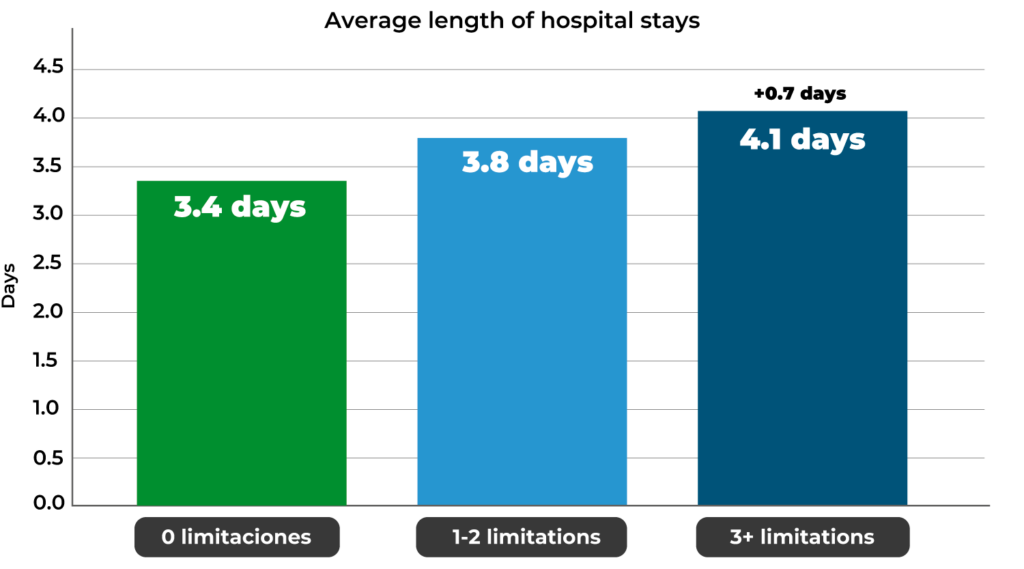The lack of long-term care services increases hospital costs and can make healthcare systems unsustainable. In Mexico, older people with functional limitations—those who need long-term care—are up to 23 percentual points more likely to be hospitalized than functionally independent individuals. Once hospitalized, they are also more likely to stay longer.
The IDB’s new study, “Care Dependence and Hospitalizations: Evidence from the Mexican Health and Aging Study,” analyzes the relationship between functional limitations and the risk and duration of hospitalizations in Mexico. The research reveals a significant cost disparity: while a day of hospitalization costs approximately $750, home-based long-term care costs around $20 per day.
The findings suggest that strengthening preventive healthcare, social services, and post-discharge long-term care for people with functional dependence could reduce hospitalizations while improving quality of life for older people. This approach is part of the IDB’s work with member countries to improve the quality of care for aging populations.
Understanding Functional Limitations in Older Persons
We classify older persons into three groups: functionally independent persons, those who need assistance with basic activities of daily living, and those who need assistance with instrumental activities of daily living.
Basic activities are essential for survival and self-care, such as going to the toilet, eating, taking a bath, or getting in and out of bed. Instrumental activities are more complex tasks that involve a higher degree of cognitive development, such as cooking, doing errands, taking medicines, managing finances, or interacting with other people.
The Hospitalization Impact: Evidence from Mexico
Older people with difficulties performing three or more basic activities of daily living can experience an increase of up to 18 percentage points in the probability of being hospitalized when compared to those who are functionally independent. For individuals with limitations in instrumental activities, the increase can be as high as 23 percentage points.
Hospital stays also tend to be longer among those with at least some degree of care needs. Once in the hospital, the duration of hospitalization increases with the severity of functional limitations, both in basic and instrumental activities.
The average length of stay for individuals with one or two limitations in basic activities averages 3.8 days—almost half a day longer than those without limitations. For those with three or more limitations, the expected stay is 4.1 days, an increase of about 0.7 days compared to those with no limitations and of 0.3 days compared to those with only one limitation. Although the average difference in hospital days between individuals with and without functional limitations may appear modest—often less than a single day—its implications are meaningful.

Hospital Costs vs. Long-Term Care
In Mexico, the average cost of a day of hospitalization is approximately $750. In contrast, each day of long-term care provided at home costs approximately $20. This means that saving that half a day of hospitalization would pay for 37.5 days of home-based long-term care.
The results align with findings from another IDB publication titled “Are Long Hospitalizations Substituting Primary and Long-term Care?: Evidence from Brazil and Mexico,” which shows that the lack of social, care, and rehabilitation services are responsible for 12% of unnecessary hospitalization days in Mexico and 25% in Brazil. The research also shows that providing just six weeks of long-term care to persons who need care after discharge could save approximately $45 million in Mexico and $174 million in Brazil each year.
Strengthening Healthcare Systems Through Long-Term Care Services
In the context of Mexico’s healthcare landscape, designing and implementing strategies that safely reduce the number and length of hospitalizations could ease the financial burden on hospitals, while simultaneously improving the quality of life of the older population. This is also the reality of many countries in the region.
The findings suggest that strengthening preventive healthcare and social services, as well as post-discharge rehabilitation and long-term care services for people with functional dependence, is a promising path to achieving these goals. To learn more about how care dependence shapes hospitalization risks and durations among older people in Mexico, read the full study here.


Leave a Reply